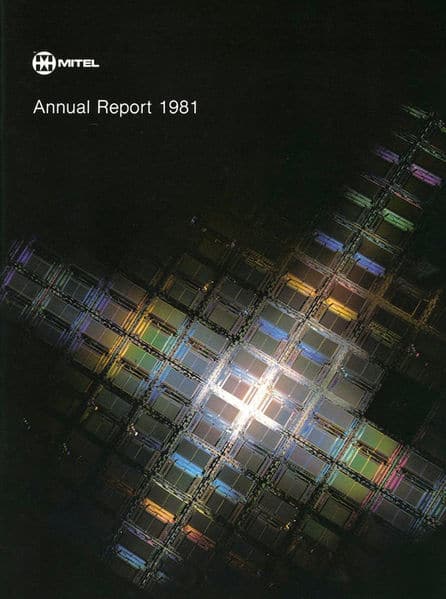
Those who follow Canadian tech know Terry Matthews is the first and last name in telecom here.
Matthews, who emigrated to Canada in 1964 from Wales, would eventually become the first billionaire in that country’s history. But if not for some poorly arranged shipping, the story might have ended very differently.
On June 8th, 1973 Matthews and buddy Michael Cowpland (of Corel fame) formed Mitel, a company intended to sell cordless electric lawnmowers. We may never know for sure if the company’s name was a combination that stood for “Mike and Terry’s Lawnmowers” or “Mike and Terry’s Electronics”, but we do know the pair never actually sold a lawnmower.
After their very first shipment of mowers was lost, the pair settled in on producing a telephony tone receiver that was based on Cowpland’s Ph.D. thesis. Less than eight years later, the company topped $100-million in annual revenues. In 1985, British Telecom acquired a controlling interest in Mitel, and Matthews was a billionaire. He used some of that fortune to buy back half of the company in 2001.
With Matthews as its chairman, Mitel went public on the NASDAQ in 2010. After stumbling out of the gate will an poorly received IPO, the company brought in industry veteran Rich McBee from Danaher to right the ship. Now sixteen months into the job, McBee presides over a new Mitel with increasing revenue, record gross margins and an growing sweet spot in moving small and medium sized businesses to the cloud. Cantech Letter’s Nick Waddell talked to McBee about Mitel’s history, Matthew’s influence, and why the Chicago Bears think Mitel gives them an advantage.
Rich, you have been involved with Mitel since January of last year. Has that been enough time to fully implement your plan?
I think a strategic plan is a dynamic thing, it’s never done. Markets change, situations change and so on. What I would say is that the first phase of our strategic plan has been very well executed. As a matter of fact I think we are ahead of schedule. What we really aimed to do was assess the company for the first ninety days in early 2011, and then we came out with a coordinated strategy across the company, which was to simplify the business, focus the portfolio, align the “go to market model” and exploit our lead in virtualization. We’ll never be done simplifying the business, making ourselves easier to do business with and easier to operate. We are streamlining the organization. That doesn’t mean layoffs. What it means is that we are looking for simplicity in the business now to make sure we can fuel the growth of a leveraged business model. Obviously you always have to focus on the portfolio, make sure you are focusing on customers. Probably the biggest change we made was to align the go-to-market model, specifically in the Americas, where we do a large percentage of our business. We performed pretty radical surgery in the Americas. The things we wanted to accomplish in the first stage are done, and, as a result, the business is doing well.
____________________________________________________________________________________________________________________
This story is brought to you by Agrimarine (TSXV:FSH). Not all salmon farms are the same. Click here to learn how Agrimarine is meeting consumer demand for sustainable aquaculture.
____________________________________________________________________________________________________________________
Do you think the public markets are starting to perceive this?
I think one of the things we needed to do was to re-establish credibility. After the company IPO’d we missed the very first quarter’s guidance, which was pretty tough. Over the past year, we have been really focused on being consistent, which we have delivered on. We have met or beat our revenue targets for the last four quarters. So I feel really good about where the company is today. I would say that we have a really firm foundation and now we are ready to start building on that foundation.
You are trading at a lower multiple than most of your immediate peers. Do you feel this gap could tighten up as you gain credibility with the street?
I think our consistent performance will eventually be rewarded, and renewed investor confidence will follow. That’s what we are laying a foundation for. When I first went out to the market we got a lot of feedback that said “Hey, I understand you are just coming into this, but the reality is that people got burned, and they are going to need to see consistent performance from Mitel before they are ready to give you the benefit of the doubt.” And I am fine with that. I think that what the company has done over the past four quarters is perform, and when people take another look at Mitel, I think they’ll begin to see the real value we have here.

A few years ago Software-as-a Service and cloud based solutions were talked about a lot, but we weren’t really being implemented as much as the chatter would suggest. Now it seems they are really starting to get a foothold. You seem positioned nicely to benefit from that…
Yes, I think so. If you look at our portfolio we have two basic platforms; the 5000, which is really aimed at SMB and is an on-premise solution. Then we have the Mitel Communications Director (MCD) Platform, which is a unique platform that gives us some real competitive advantages. MCD is a single software stream that allows us to have an on-premise, hosted, or cloud-based solution. This is a product we sell directly to customers, or we sell to carriers and they provide hosted services to their customers. We also provide cloud-based services ourselves under the product name “Mitel AnyWare”. If you think about a two-by-two grid, we really have the market covered, from on-premise, to on-premise hosted, and all the way out to the cloud. We can provide equipment and services to people who want to do it themselves, or we can do it for them. We’re seeing good growth in cloud-based services and I think virtualization is another key aspect of that. We were out front very early on in providing truly virtualized solutions. So, I do see the cloud growing for us. The pundits say by 2015, maybe 15% of the market place will be cloud-based or hosted services. Of course that still means 85% isn’t, so I think we are well positioned to catch that growth wave and address the existing available market.
It also leaves you a lot of runway…
Absolutely. When you think about the portfolio we have built, we can do cloud, hosted… anything. And it’s all on the same platform, which is unique. If you look at our competitors, most of them have different platforms for each solution. We have a single software stream, and so one of the real advantages we have is that a customer can say “I’m not so sure about this private cloud stuff, I want to do this the traditional way for now.” That’s fine with us, but as the customer wants to move to a virtual or hosted environment they can stay on that same software stream, the same licensing structure and just move. We are seeing a lot of customers who are very interested in our cloud-based virtualized solution but they’re not quite ready to go there yet, and so the reason they are buying Mitel is that they see the seamlessness between our platforms.
I wonder if you could walk me through a recent deal, either the one you did with J.W. Marriott or with the Chicago Bears and talk about how you improved their communications?
Let’s use the Bears. One of the key things about the Chicago Bears is that they virtualize a lot of their business applications and they were wondering if they could virtualize their voice and UC applications as well. The UC applications were really important to them because that’s where they get a differentiated advantage. When they looked at Mitel, they were happy to realize that they could have a hybrid system, part of which could be a premise based solution and another part could be a virtual solution. Mitel was able to give them what they wanted. Mitel has also taken the strategic decision to develop an open architecture that truly supports the concept of “bring your own device”, and so the mobile apps Mitel was able to offer was also key for the Bears. They were excited about the ability to link in multiple types of handsets and devices – including the coach’s iPad, which is used to run plays on the field – that could seamlessly work with the UC applications. This was very important to them.
Let’s talk about the geographic breakdown of your business, any emerging markets set to be a factor?
A big part of our market share is in the US, Canada and the UK, and I have made a very conscious decision to try and not go everywhere at once. Very strategically, we are picking one, two and three countries and investing in those markets. As far as expansion, we look at it more as bolstering geographies where we have a foothold, such as Australia and in parts of Asia.
You have been in telecom for twenty years. What are your impressions of having Terry Matthews as Chairman, did that factor in your decision to join Mitel?
I really looked specifically at the attributes Mitel had; really good technology and good people. I think the company had fallen on hard times a bit, but coming from Danaher, I felt it was a space I understood well and it was well within my comfort zone. Terry was just a bonus. There isn’t a person in the business that he can’t pick up the phone and call, so he helps the business in that way. I think day to day operations are clearly the responsibility of the management team. He’s a great serial entrepreneur, but Mitel’s not really in that entrepreneurial space anymore. It’s a $600-million plus company. Terry has a group of affiliates that he funds, and they can act as valuable accessories to the Mitel car, if you will.
What do you hope to accomplish in the next year?
Over the next year, we want to raise Mitel’s brand awareness globally. It’s a brand that we’re all very proud of, but isn’t well known in the marketplace. Through marketing initiatives and other activities we intend to broaden the reach of Mitel’s brand. Another thing I want to focus on is to continually listen to the voice of the customer, both the end customer and our channel. This is really part of building the next floor on the Mitel foundation. There are some great opportunities out there, it’s very exciting what’s going on in the marketplace. Those opportunities, married with the unique technology company that we are, makes me optimistic because we’ve got some pretty exciting things on the horizon.
_______________________________________________________________________________________________________________________
_______________________________________________________________________________________________________________________
Comment
Leave a Reply
You must be logged in to post a comment.




 Share
Share Tweet
Tweet Share
Share




Does Terry remember that Mitel went public once before (in the late 70s). I had to borrow $1400 from my credit card to buy 100 shares. I remember because that 100 shares put my daughter through college.
Great story, Kenneth. Thanks.